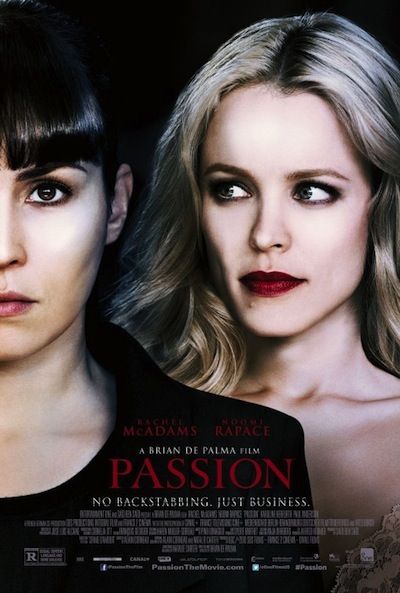
for the entire interview go here:
http://www.aintitcool.com/node/63531
Ed here: I look at long careers this way. Have they given me more pleasure than not. In the case of filmmaker Brian DePalma the answer is definitely yes.
Ain't It Cool News:
PASSION is back-to-basics Brian De Palma: a sexy, slippery corporate thriller infused with just enough kink to call to mind the full-blown eroticism of classics like DRESSED TO KILL, BODY DOUBLE and FEMME FATALE. Based on the 2010 film by Alain Corneau, it's an unusually contained movie for the director; this is close-quarters combat between two ambitious women (Rachel McAdams and Noomi Rapace) desperate to maintain and/or acquire power within a major advertising agency. Their battlefield is the company's Berlin office and the bedroom, and, this being a Brian De Palma film, there are cameras observing every last inch. Surveillance is a given. They're watching. We're watching. It's a twisted little game of shifting and constantly unreliable perspective.
PASSION also finds De Palma picking up where he left
off eleven years ago with FEMME FATALE. While that film was a genre study of a
female archetype resisting her predetermined-by-gender doom, this latest work
unfolds in a workplace seemingly controlled by women. There are men knocking
about, but they're pawns relegated to the periphery of De Palma's narrative
(this is his first movie without a major male character); there's nothing to
overcome here but another woman. Though two films aren't enough to categorize
this as a phase (especially when they're broken up by two testosterone-heavy
movies), it appears pretty obvious that De Palma, after decades of pondering
male inadequacy, would prefer to keep cinematic company with women exclusively.
But by his own admission, De Palma isn't currently
in a position to dictate the direction of his career; the next film is
basically the one that finds financing first. In fact, had he managed to get
THE BOSTON STRANGLERS or THE UNTOUCHABLES: CAPONE RISING off the ground at Paramount,
it's likely PASSION would've never been made. So the extent to which there is a
phase nowadays, even for one of our greatest living filmmakers, is accidental.
You make what's greenlit.
Fortunately, De Palma is not one to remain idle.
While he's out promoting the joint theatrical/VOD release of PASSION, he's
moving forward with HAPPY VALLEY, his Joe Paterno biopic starring Al Pacino.
There's also the possibility of a Daft Punk musical based on the director's
1974 cult hit PHANTOM OF THE PARADISE. De Palma's still raring to go, and the
dextrous staging of PASSION - in particular the split-screen set piece
juxtaposing a murder with a performance of Debussy's AFTERNOON OF A FAUN -
proves there's plenty of zip left on his fastball. It's just a question of
whether studios or financiers understand that there's a hunger for what it is
he does as well as anyone out there: pure cinema.
Mr. Beaks: This is a genre you know well. Having
made so many thrillers, how do you apply your style without repeating yourself?
Brian De Palma: It's great to start with something
that's pretty good to begin with. The Alain Corneau movie has a very good
character relationship: these two women who are basically destroying each
other. I use a lot of that dialogue in the beginning. But in his original
movie, it's revealed right at the beginning that Isabelle kills Christine. I
wanted to keep the audience guessing right until the end. I thought that that
would make it a very good mystery. Christine... she's got enough enemies around
the office, and to put Isabelle into this place of "Did she do it? Did she
dream it? What the hell happened?" Just keep the audience guessing right
until the reveal at the end. I had a chance to do all of these surrealistic
sequences where you're not quite sure whether it's happening or not.
Beaks: Which is a hallmark of yours. It's also
something I think movies are afraid to do nowadays, which is to completely
befuddle the audience.
De Palma: It's that kind of mystery procedural drama
that's done all the time on television, so you've got to come up with something
a little different.
Beaks: This is a film that's very contained in terms
of locations, which forces you to place a very high premium on locations.
You've chosen some visually striking interiors that also seem to comment on or
reflect the twisted nature of the power struggle between these two women. How
did you go about finding these locations?
De Palma: Good art director and a lot of good luck.
A lot of it takes place in offices. We were first going to set it in London,
and we were going to shoot the interiors in Berlin. But when I went to the
London location, I said, "Why don't we shoot the whole thing in Berlin?
It's an international corporation." There are a lot of really great exteriors
in Berlin that no one had seen before, so we moved the whole production to
Berlin. And we were very fortunate to get this great office building that was
vacant because of the recession, so we could sort of take it over. That's
always the problem with office buildings: you've got to work around the office.
But this was not the case here. It was a great looking building that gave us
interesting office locations, which, of course, can be extremely boring.

No comments:
Post a Comment